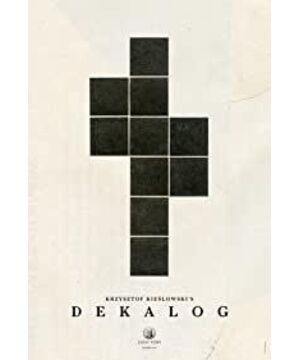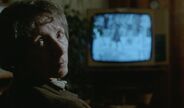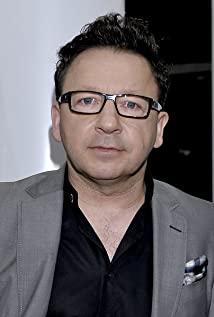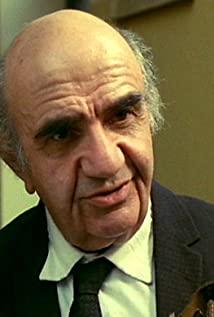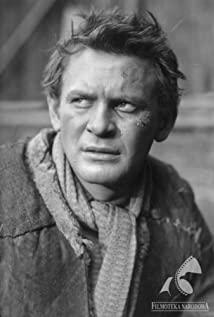2012-12-08 On Saturday, "Dream Movie" Jiedaokou store played the "Ten Commandments" in "Do not kill".
The plot is very simple, but the suspense is set at the beginning, and the story is told through three alternate clues by three characters, until the murder happens, these three characters finally intersect, and the story finally merges into one clue.
Clue 1:
The young Yazek seems to be a sullen guy. The overpass quietly throws stones at the windows of the speeding cars below, scares away the pigeons fed by the old man, pushes a person who is on the trumpet into the urinal, and so on. mischief.
But occasionally he stops, for example, he holds a photo of a little girl and asks the boss to enlarge and develop it - "I heard that you can judge people's life or death just based on the photos?" "Don't listen to the nonsense of outsiders"; The window glass makes the two little sisters laugh; for example, when he sees someone painting a little girl in the square, and when he sees a picture of a dignified and quiet little girl hanging in the photo studio, he will also be absent-minded and melancholy, and the movie will be accompanied by a sad voice that seems to miss the past. music.
Clue 2:
The uncle of the taxi driver seems to have a lot of vulgar tastes, such as approaching the young waiter and peeking at her thigh; there is also the bossy style of "I have the final say" of the employees of state-owned enterprises in the planned economy-he sometimes clearly sees some People urgently need a car, so he just wants to play a prank and gallop past in front of others.
In fact, Fromm mentioned in "On the Origin of Violation" ["Love of Life" p 62] that some post office workers like to send away those customers who have been queuing for a long time. "The sadist closes his window not just because business hours are up, but because it will give him a pleasure to close it. Although his salary may not be very high, sadistic pleasure is as wonderful as money , without it, he wouldn't think about doing it."
But he also has moments of tenderness, such as feeding stray dogs some of his own pastries, such as giving way to some children who are standing in line to cross the road.
Clue 3:
A lawyer who has studied law for 4 years and practiced for 4 years is taking an oral exam. He talked about his own legal ideals, his understanding of homicide, and his criticism of some evil laws. The core idea is that the legal system can only adjust the "group of power," and that since Cain killed his brother, no punishment has been enough to redeem a person, and punishment and revenge have little effect. He himself hopes to correct some legal mistakes in the system, but for a long time he has felt powerless, as if the benchmark of his own values is constantly lowering.
In the end of the murder case
, the teenager bought a piece of hemp rope from the cafe and let the driver's uncle go around in circles aimlessly. At that time, the teenager had already taut the hemp rope between his hands behind the car. In the film, there is a scene of dark clouds overcoming the city, and the background music seems to have drums rumbling, beating our hearts.
However, when he saw the driver give way to the children, the taut rope wrapped around his hands and relaxed involuntarily.
At a certain intersection, the teenager saw a man holding a ruler and waiting for the traffic light. It was the man who pushed the urinal, and he retracted into the back seat.
Arriving in the wilderness, the young man finally started. He tried hard to restrain the driver's head with a rope but failed, so he first tied the driver's head to the driver's seat with a rope to reduce the driver's struggle. The driver resisted so hard that even his shoes and socks broke free.
Later, the driver had to stop the car and honked his horn desperately. On the far embankment, a man was riding his bicycle leisurely. Maybe he hadn't heard the horn. A black horse was grazing on the shore. It heard it and tilted its head, but continued to lower its head to graze. Suddenly, a train rumbled past not far ahead, and the young man quickly got out of the car to avoid it. The driver had a rare chance to catch his breath, but his head was entangled in the back seat, and there was no way to untie or break the rope for a long time. The train has already left. The boy then came in again and hit the driver on the head with a stick, blood spurted out, and he no longer struggled.
The teenager then dragged the driver out of the car with his coat and wanted to throw it into the river. The driver was still grumbling and begging for mercy - "I have some change in that box, please forgive me. Please forgive me" The
young man lifted a big rock and smashed the driver to death, finally exhausted to complete his murder mission.
Back in the car, I turned on the radio, and a group of children were playing cheerful songs. The teenager hysterically ripped the radio off and threw it into the mud.
After the
trial was over, the lawyer met the judge in violation of the rules and was very anxious about his performance today. The judge comforted: "This is the best defense I have heard in the past ten years, but this child cannot escape the death penalty. Even if the experience changes more The same goes for an old lawyer. Maybe it's me, the judge who should be replaced. Please don't worry, what's wrong with this case, I'm responsible for it."
"I remembered that the kid said that the rope he committed the crime was stolen from the so-and-so cafe. , he said that he often went to that cafe. In fact, I went to that cafe on the day I took the law test. I think I should have passed him by once. If I have the opportunity to know him, can I save it? He, let him not have what happened today?"
"Young man, today's case has made you at least one year older. You are too sensitive, and it seems that you are not suitable to be a lawyer." The
lawyer walked to the window helplessly and saw that the teenager was being Incarcerated on remand. He called the boy's nickname from a distance and beckoned. The boy also looked back at him.
Before and after
the execution, the executioner was busy lubricating the gallows and adjusting the curtains.
Prison guards arranged a final meeting between the lawyer and the juvenile. Before the lawyer went in, he met the prosecutor. The prosecutor congratulated him on his recent happy son, and of course apologized that it seemed out of place to congratulate him in prison.
In the stairwell, the blank figure walked by carrying the ladder.
The teenager asked a lawyer to see his mother, just after the execution. When my mother learned that he had been executed, she just cried to the lawyer without saying anything.
Teenager: Actually, in court, everyone is against me...
Lawyer: No, they are not against you, but against your behavior.
Teenager: Actually, it's almost the same. The court hearing, in fact, I have never listened to. But when the court session was over, I was about to be taken into the prison van. I heard you call my name. I have been wandering outside for five years, and no one has ever called my name. I was in tears.
I now think that when I die, I hope to be buried in my family's grave. Can such a sin as me be buried according to the ritual?
Lawyer: It should be possible.
Teenager: Actually, that is the double tomb. It was originally the place of my parents, but now I have to go earlier. My sister died 5 years ago when she was 12 and in sixth grade.
I thought if my sister was still alive, maybe none of this would have happened.
Lawyer: Huh? Won't this case happen?
Teenager: Yes. She was hanged by a tractor. The driver is still an acquaintance of mine. We drank together at the time, and we both drank too much. Then he drove drunk and my sister died in an accident.
We have three brothers, but my sister and I have the best relationship. After my sister died, I ran away from home for five years. I didn't see my family until this court session.
By the way, I also have a photo studio ticket in my pocket, which is my enlarged photo of my sister's first communion. I took it from my mother's drawer when I ran away from home. Can you help me take it out and give it to my mother?
The prison guard came in for the second time and urged the lawyer, "How long until the conversation ends?" The
lawyer roared: "Go tell the prosecutor and the warden, there will never be an end." The
prison guard left reluctantly.
When it was finally time for the execution, several prison guards forcibly rushed in and carried the boy away. The boy cried and cried in despair and broke free from them for a moment, but he was quickly grasped tightly.
Before the execution, the prosecutor meticulously checked his identity, read the execution decision, and lit an unfiltered cigarette at the request of the teenager. That moment was a rare moment of silence.
Then the execution began. The prison guard and the executioner cooperated very well. Several people shouted their numbers, as if they were in a labor competition in a hurry. Their movements were so quick. A life ended so quickly.
At the end of the film, on a sunny day, the lawyer drove alone into the fields and shouted, "I hate you, I hate you..."
Discussion summary:
The movie is titled "Don't Kill", but it still happened in the movie There were two homicides, one in which a juvenile killed a driver, and the other in which a juvenile was executed. The details of these two events are very rich, depicting the desperate struggle and helplessness of the murdered.
However, the Ten Commandments "Do not kill" seems to be interpreted as "Do not kill without reason". Since ancient times, murders in various names have always occurred.
The reason for this boy's murder is actually not certain. He has no grievances with the driver at all. In fact, it is also caused by his own temperament defect. At the end of the film, it is mentioned that his sister died unexpectedly at a very young age, and he himself deeply blamed himself, because it was he who was drunk with the driver who caused the accident. In the 5 years that he ran away from home, he suffered from the scorching world and received little love, and he himself treated the world with indifference and even malice. The sustenance of love in his own life, which may have been very large, collapsed with the death of his sister. The mainstream Polish ideology that was not directly pointed out in the film also lacked warmth, but perhaps the mainstream of Poland also deliberately created some empty ideas that conform to the concept of historical progress. The national value of being close as a family, but it has become a kind of ritual. We can see from the performance of the driver that their words and deeds are actually not in line with the political correctness of mainstream ideology. Even if he has occasional kindness, it is purely a personal choice. Authority to abuse, of course, there is no need to criticize the driver personally, because the mainstream ideology has been inconsistent with its words and deeds, and no one really believes in it, but the mainstream ideology strongly rejects other values, such as traditional, religious, Western, Considered as a beast of a flood, because of such a strong intervention, it will lead to a hollow value. Doing good is just a passing hobby.
Gan Yang analyzed in the article "The Political Philosopher Strauss" that under the "concept of historical progress" of modernity, "in such a world where everything flows and everything changes, and everything is only asked whether it is trendy or not, In a world that everyone advertises as advancing with the times, is there any standard of 'good or bad', 'right or wrong', 'good and evil' that is independent of this change... The standards of the world are all changing with history and thus capricious? If so, is there any eternal thing, eternal person, and eternal karma that are precious and worthy of being kept in the hearts of the world and even admired for generations to come?”
The modern legal system itself punishes people's behavior, regardless of their moral quality, otherwise the law will become a tool to monitor and punish everyone's heart, which will easily lead to the politics of espionage. Gan Yang believes that "although modernity is built on the basis of 'low but solid', it is not without its legitimacy, but its 'vulgarity' ultimately leads to the greatest paradox of modernity, that is, modernity was originally Raising man to the status of God results in lowering him to the status of an animal. Strauss therefore stated in his "Liberalism Ancient and Modern": "The most urgent duty of a truly free man today is to fight with all his might. A perverted liberalism that preaches that the only purpose of man is to live happily without discipline, but completely forgets that what man seeks is nobility, excellence, and moral perfection. Rousseau once tried to build a "
moral ideal state", but Robespierre led it to tyranny. How to shape morality is indeed a question that transcends ideology and political system. Just as Liu Xiaofeng believes that "a person's temperament It is formed naturally and randomly. No matter how good the social system is, it is impossible to trim the natural and random individual temperament into an exquisite garden. A good social system arrangement may minimize the destructiveness caused by the random factors of human disposition, but it cannot completely eliminate the evil caused by the random factors of human disposition. "
There are too many accidental factors and environmental influences in the formation of each person's physical talent, personal temperament, and enthusiasm for life, which cannot be controlled and influenced by ideology and social systems.
In a modern society, the main function of the law is to punish people rather than save them. People. Even Zhang Yihe has similar feelings in "Liu's Girl", but the construction of a reasonable reform system itself is a major problem.
The director himself did not completely vilify the drivers and teenagers, and tried his best to discover the kindness of their humanity. On the one hand, and towards the end of the film, the young man's thoughts about his family, his feelings for his sister, and his gratitude and trust for the lawyer were very touching.
Then there is the role of a lawyer. He does have a belief that goes beyond the legal profession. When he took the oral exam for the bar exam, he said that he hoped to try his best to correct the mistakes of the system. He hopes to recognize and save the boy earlier, the judge will think that he is too sensitive. Before the juvenile was executed, he resented the excessive indifference of the juvenile's life in the prison, and roared loudly: "There will never be an end." At the end of the film, he went to the wilderness and shouted: "I hate you, I hate you." The
lawyer The belief of this character is closer to Judeo-Catholicism, such as a Jewish scripture: "To save a man is to save a world, and to destroy a man is to destroy a world." But such values are difficult to be constructed as political by modern legal systems. Legal System. The separation of church and state in Western society is achieved after many years of struggle.
An audience friend said that this movie is very similar to Camus' "The Outsider". The hero of the novel was manic and behaved arbitrarily before, and he ended up in a prison cell. Sentenced to death. The audience asked, is this teenager's behavior unreasonable?
However, I said on the spot that the label "nonsensical" should not be posted randomly. In this film, the director has meticulously portrayed the struggle and redemption of several characters. A good work cannot be summed up in short sentences in the style of news headlines, which is certainly sensational, but makes the work lose its vitality.
Moreover, the puzzling plot in front of "The Outsider" is to pave the way for the final outcome. Even though the male protagonist is full of evil, he is alone in his cell, looking at the moonlight outside the barbed window.
Existentialism itself reveals the predicament of human existence in absurdity, just like Heidegger's "Existence and Time", [Only from the "time perspective" can we grasp or understand the meaning of "Dasein" or even "existence", but he The so-called "time", or his so-called temporality and historicality, all refer to a "moment" or "moment" that suddenly "explodes" or "ecstasy" or the so-called "self-detachment". Strauss's book title "Natural Justice and History" seems to ask vaguely whether there is still "justice" under Heidegger's "time" and "history"? Can "Dasein" become a being that asks about "justice"? Does "existence" imply at least some possibility or impossibility of "justice"? In such a "moment" of "explosion" or "ecstasy", or in this "special moment", is there any difference between "good and evil", "good and bad" , "right or wrong" standard? Strauss argues that Heidegger's philosophy leaves no room for "political philosophy" because this space is reserved for some known or unknown "god". But in Strauss' view, the development of the "concept of history" of Western modernity to Heidegger's concept of "time" is precisely the most thorough nihilism, because if everything is determined only by "fate" Unable to grasp the "ecstasy moment", then all human choices can only be "blind choices", people are exempted from the responsibility of choosing good and evil and right and wrong, good and bad and right and wrong, so "we can no longer do Living as a responsible being”, which shows that “the inevitable practical result of nihilism is blind obscurantism
.” As quoted above, “value nihilism” is a major modernity problem that every civilization and country with different systems will face, Specific to individuals, it may be reflected in the erratic and repeated actions of drivers and teenagers.
In the two camps during the Cold War, their mainstream culture or subculture system will create a small number of enemies in their respective camps, using distinction The way to maintain the order of the mainstream or subculture.
For example, in the Eastern European camp, because of the influence of the Soviet Union, criminals will also be included in the scope of class enemies, and then executing the death penalty is also a mass ritual. The politics of this intimidation model is indeed heartwarming. Numb, but too primitive, and the ruling technique is not refined enough. Foucault's article on the change of the penal system has been discussed.
In the 1960s in the United States, racists in the South would boycott the black civil rights movement and the implementation of Congress's Black Rights Protection Act. When President Kennedy was assassinated, Martin Luther King Jr. wrote a lengthy tribute.
[Because of the murder of President Kennedy, the American people should do a series of reflections in the depths of their souls. Bullets fired from five floors must not be downplayed to the isolated behavior of a mentally ill person. Integrity drives us to look beyond the madness of doing such a cowardly thing. While questions like "who killed President Kennedy" are important, it's even more important to ask "what killed him." 】
【The unforgivable absence of law in our society is to ignore the existence of political murder. My judgment doesn't sound right, but it's true that the reason for this absence is because of the identity of the victims -- they're all black. So, such murders spread like a plague until it claimed the life of one of America's finest, most beloved and respected presidents. When Jesus said, "You have done these things to the least of my brethren, you have done them to me." He wasn't just using metaphors, these words were real prophecies. ]
He told us all that the poison of this hatred has eroded into the blood of our country; if it is allowed to develop, it will inevitably lead to the moral and spiritual destruction of our country.
In this way, John F. Kennedy's epitaph enlightens us with profound truths, inspiring us to step out of the mourning atmosphere and move forward with greater determination to eradicate the remnants of segregation and discrimination in our country.
The murder of President Kennedy not only killed one person, but shattered many illusions. It debunks the myth that hatred and violence can be packed into a sealed space and used against some people. The truth suddenly shows that hatred is contagious, that it develops and spreads like a disease, and that no society is healthy enough to automatically maintain its own immunity. If smallpox had been prevalent in the South at that time, President Kennedy would have to be strongly advised not to go there. At that time, the South was ravaged by plague, but the extent of its danger was unaware.
[John F. Kennedy's death concerns us all. We tolerate hatred; we tolerate violence in all walks of life; we tolerate individualized enforcement because of the fallacy that a person's life is sacred only if we agree with that person's point of view. This may explain why tears of grief flooded the American soil in late November. We mourn a man who has become our nation's pride, while we grieve the disease in ourselves. ]
Regarding the blank character that appeared three times in the movie, I will not interpret it for the time being.
The director himself mentioned people of different ages in the film, lawyer's baby, teenager's sister (child, death), teenager, lawyer (close to middle age), judge, prosecutor (old age), driver (death) these different stages All of them were directly and indirectly involved in this murder case. When the lawyer finally met with the juvenile, the prosecutor congratulated the lawyer on his happy son, but there was a man who was about to die in this prison. A new life is born, but with a young life about to die, it is really helpless. Lawyers who work so hard are actually expecting their descendants to live in a more humane society. The director tried his best to take care of a more complete life style.
Tuesday, December 11, 2012 23:35:00
View more about Dekalog reviews


